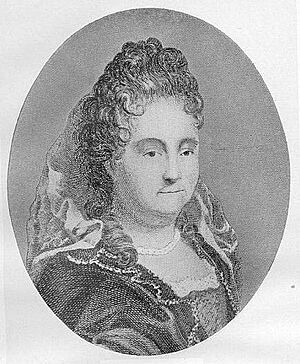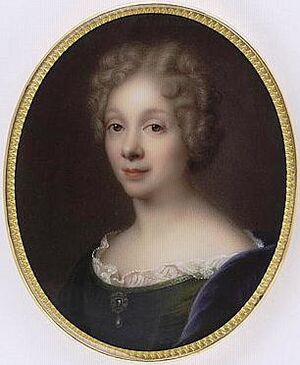Anne Dacier facts for kids
Quick facts for kids
Anne Dacier
|
|
|---|---|
 |
|
| Born |
Anne Le Fèvre
c. 1651 |
| Died | 17 August 1720 (aged c. 69) |
| Nationality | French |
| Occupation | Linguist, translator, writer, commentator and editor of the classics |
| Spouse(s) | |
| Parent(s) | Tanneguy Le Fèvre Marie Olivier |
Anne Le Fèvre Dacier (around 1651 – August 17, 1720) was a very smart French scholar. She was better known as Madame Dacier during her lifetime. She was famous for translating and editing ancient Greek and Latin books. These included famous works like the Iliad and the Odyssey.
Anne Dacier wanted to make old literature popular again. She used her amazing skills in Latin and ancient Greek to do this. She also used her skills to earn a living. She created many editions and translations of classic texts. Her work helped show that women could be great scholars too.
Contents
Early Life and Learning
We don't know the exact date Anne Dacier was born. Most sources suggest it was around 1651. She grew up in different towns in France, including Preuilly and Saumur.
Her father, Tanneguy Le Fèvre, was a scholar himself. He taught Anne both Latin and ancient Greek. This was unusual for girls at that time. Her early education helped her become a brilliant translator later on.
In 1662, she married Jean Lesnier II. They had a son who sadly passed away very young. The couple separated around 1670. In 1683, Anne married André Dacier. He was also a student of her father and worked on classical studies.
Bringing Ancient Classics to Life
After her father died in 1672, Anne moved to Paris. She brought with her part of a book she was editing, called Callimachus, which she published in 1674. A friend of her father, Pierre-Daniel Huet, helped her find more work. He was helping the Dauphin (the king's son) with his studies.
Huet asked Anne to work on a special series of books called the Ad usum Delphini (or Delphin Classics). These were editions of Latin classics made for the Dauphin. For this series, she edited works by authors like Publius Annius Florus and Eutropius.
In 1681, Anne published her prose (regular writing) versions of poems by Anacreon and Sappho. Over the next few years, she translated plays. These included Amphitryon by Plautus and Plutus by Aristophanes. Her translations of Aristophanes were the first ever in French. She also translated all six comedies by Terence.
In 1684, Anne and her husband, André, moved to Castres. They focused on religious studies there. In 1685, King Louis XIV of France gave them a pension. This was a payment for their decision to become Catholic. Anne and André also worked together on some translations. They translated Meditations by Marcus Aurelius and parts of Parallel Lives by Plutarch.
Translating Homer's Great Epics
In 1699, Anne Dacier's prose translation of the Iliad was published. This work made her very famous in French literature. Nine years later, she published a similar translation of the Odyssey. The famous English poet Alexander Pope found her translation of the Odyssey very helpful for his own work.
Anne Dacier later wrote comments on Pope's translation of the Iliad in 1724. This also made her well-known in England. Her translations helped many people enjoy and understand these ancient stories.
See Also
 In Spanish: Anne Dacier para niños
In Spanish: Anne Dacier para niños
 | Emma Amos |
 | Edward Mitchell Bannister |
 | Larry D. Alexander |
 | Ernie Barnes |


